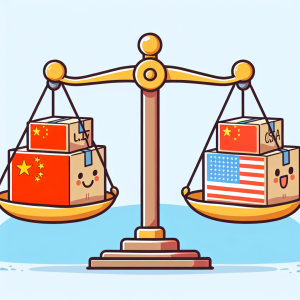The recent announcement of fresh U.S. tariffs on a range of imports is sending shockwaves through emerging markets, raising concerns about the potential impact on the cost of living in Singapore. As the global economy grapples with escalating trade tensions, Singaporeans are left wondering how these developments will affect their daily expenses and overall economic stability.
The imposition of tariffs, particularly on Chinese goods, has already led to significant volatility in financial markets. The S&P 500 and Dow Jones Industrial Average have seen declines, with the former dropping 0.2% and the latter 0.9% in a recent trading session. This volatility is a reflection of investor fears surrounding the potential for a prolonged trade war, which could dampen economic growth and corporate profits. In Singapore, a hub for trade and finance, these fluctuations can have direct implications for consumer prices and business operations.
Rising Costs of Goods and Services
As tariffs increase the cost of imported goods, Singapore, which relies heavily on imports for various consumer products, may see a rise in prices. Essential items, from electronics to food, are likely to become more expensive as businesses pass on the costs to consumers. The technology sector, already affected by tariff-related uncertainties, could witness higher prices for gadgets and devices, impacting everyday spending for Singaporeans.
Economic Growth and Employment Concerns
Moreover, the broader implications of these tariffs extend beyond immediate price increases. Analysts warn that prolonged trade tensions could lead to a slowdown in economic growth, which might affect job security and wage growth in Singapore. With companies facing higher costs and potential declines in consumer spending, businesses may be forced to reevaluate their hiring strategies or even consider layoffs.
Global Economic Implications
Singapore’s economy is intricately linked to global trade, and the repercussions of U.S. tariff policies are being felt far beyond its shores. Global leaders, including those from the European Union and Japan, are expressing concerns about the economic fallout. The EU is preparing potential retaliatory measures, while Japan is seeking to negotiate a more favorable trade relationship with the U.S. This international uncertainty could lead to a more cautious economic environment, further impacting Singapore’s growth trajectory.
In conclusion, as fresh U.S. tariffs loom, Singaporeans must brace for potential increases in the cost of living and broader economic implications. The hope is that negotiations will yield a resolution to these trade tensions, but until then, the outlook remains uncertain. Consumers and businesses alike will need to navigate this evolving landscape with caution, as the effects of these tariffs ripple through the economy.





